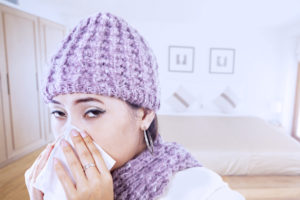November 20, 2014 | Black & Kletz Allergy

The viral infections usually begin as “cold-like” symptoms with sneezing, followed by copious amounts of clear mucus in one’s nasal secretions and usually are associated with nasal congestion. Some of us also can have a skin rash, low-grade fever, sore throat, and/or frequent cough. Many children and adults recover spontaneously from these infections after a few days. However, they can result in aggravation of asthma, causing the typical symptoms of wheezing, chest tightness, coughing and/or difficulty in breathing.
A few precautions during the coming season may ward off flare-ups of asthma, the suffering, and the loss of productive time:
- Avoid exposure to the cold air to the extent possible. Wearing a face mask while walking outdoors during the height of winter can be helpful.
- The air can be very dry indoors and can irritate the respiratory passages. A room humidifier will help in hydration of the air we breathe.
- General hygiene, frequent hand-washing, avoidance of sharing utensils, etc. may prevent certain infections.
- Staying home when sick and covering the sneezes and coughs can keep the infections from spreading.
- Plenty of fluids, rest, and eating well will help in a faster recovery.
- Antibiotics usually have no role in viral illness, except in rare secondary bacterial infections.
- Receiving the influenza vaccination (flu shot) as soon as possible in the season.
- Pneumococcal vaccine, as per indications.
Children and adults with a history of frequent flare-ups of asthma during the late fall or early winter should begin taking the daily controller medications on a regular basis starting early in the season. At times, one also may need to increase the doses of preventive maintenance medications.
The board certified allergists and staff at Black and Kletz Allergy practice are always available to answer questions and address the concerns of people in the greater Washington, DC, Northern Virginia, and Maryland metropolitan area who may be dealing with above conditions. Feel free to contact us by phone or via our “Request an Appointment” page on our main website to make an appointment.












